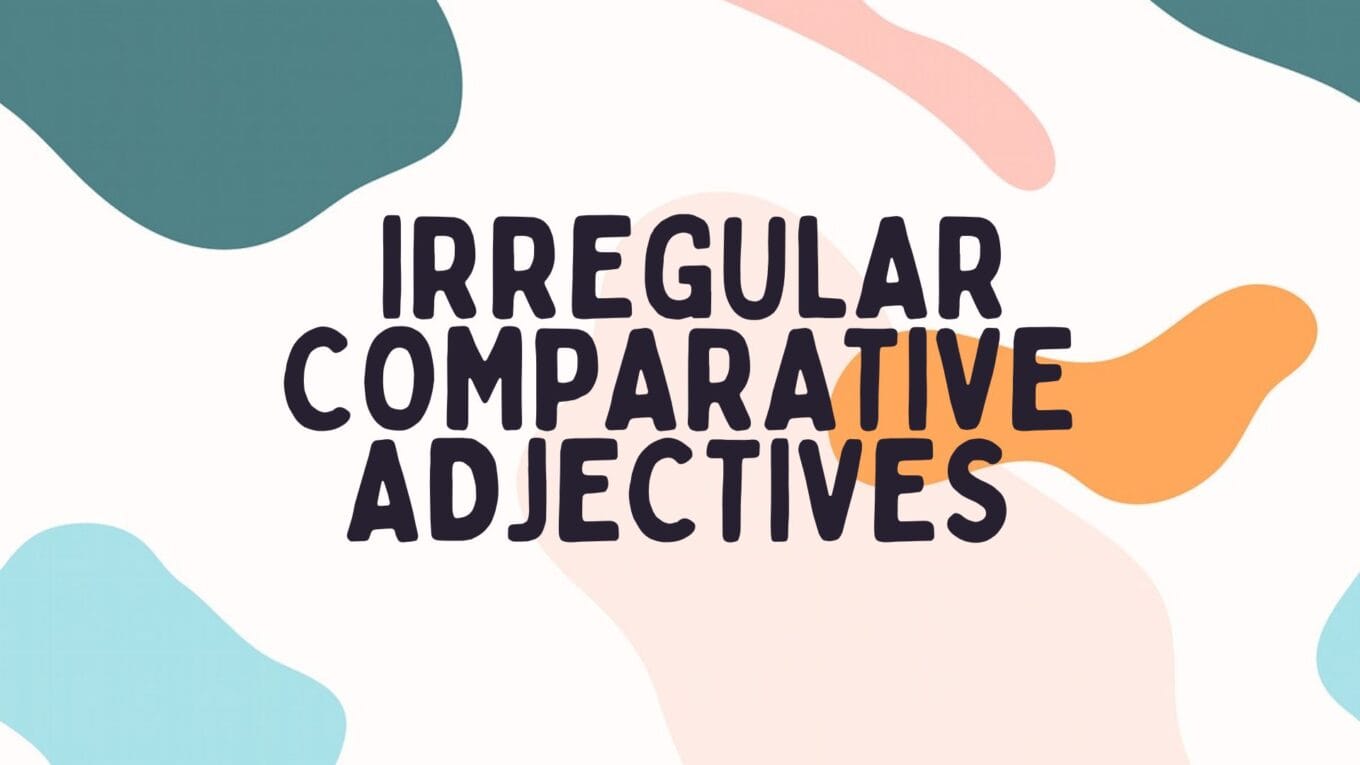Are you struggling to understand irregular comparative adjectives? You’re not alone!
Unlike regular comparatives, which follow a simple pattern, irregular comparatives, like “better” and “worse,” often confuse learners.
What if you could easily spot and use these irregular adjectives without any trouble? By the end of this blog, you’ll have a clear grasp of how to use them correctly.
Please keep reading to uncover the simple rules behind these tricky adjectives and master them.
Key Concept: What Are Irregular Comparative Adjectives?

Defining Irregular Comparative Adjectives
Irregular comparative adjectives are words that don’t follow the usual rule of adding “-er” to the end of the adjective. Unlike regular comparatives such as “big” becoming “bigger,” these adjectives take different forms.
How They Differ from Regular Comparative Adjectives
We typically add “-er” or “more” before the adjective to show comparison in regular comparatives. For example, “big” becomes “bigger,” and “happy” becomes “happier.”
However, irregular comparatives don’t follow these rules; instead of adding “-er,” their entire form changes.
Common Examples of Irregular Comparative Adjectives
- Good → Better
- Bad → Worse
- Far → Farther/Further
These forms must be memorized since they don’t follow a predictable pattern.
Why Are Some Adjectives Irregular?

Historical and Linguistic Reasons for Irregularities
Some adjectives are irregular because they come from older forms of the English language. Over time, how we compare adjectives has changed, but certain words have retained their original forms.
These irregular comparatives have roots in languages like Old English, where grammar follows different rules.
Influence of Old English and Other Language Roots
Old English and other language influences, such as Latin and Germanic languages, shaped many of the irregular adjectives we use today.
For example, “good” comes from the Old English word “gōd,” and its comparative form “better” evolved from the older version “betera.” This mix of linguistic history gives us the irregular forms we use now.
More Examples of Irregular Comparatives
Additional Common Irregular Comparatives
Below are more examples of adjectives that don’t follow the usual comparative pattern:
| Base Adjective | Comparative Form |
|---|---|
| Little | Less |
| Much/Many | More |
| Well | Better |
| Bad | Worse |
| Far | Farther/Further |
These irregular adjectives are used often in daily conversation, so learning their forms will help you improve your language skills.
Usage Tips: When and How to Use Irregular Comparatives Correctly

Common Mistakes with Irregular Comparatives
A frequent mistake is applying regular rules, like saying “gooder” instead of “better.” Another error is confusing “farther” and “further.”
Remember, “farther” is usually for physical distance, while “further” refers to metaphorical distance.
Tips for Correct Usage
It’s important to memorize these forms to avoid errors. For example, use “better” instead of “more better” or “good.” Consider the context when using words like “farther” and “further.”
Example Sentences
- Correct: “She feels better after resting.”
- Incorrect: “She feels more better after resting.”
Interactive Section: Practice with Irregular Comparatives

Test your knowledge! Fill in the blanks with the correct irregular comparative adjectives.
Quiz:
- Today is _____ (good) than yesterday.
- She has _____ (many) friends than I do.
- This puzzle is _____ (bad) than the last one.
- He ran _____ (far) than anyone else.
- I feel _____ (well) after a good night’s sleep.
Answers:
- Better
- More
- Worse
- Farther/Further
- Better
Final Words
Mastering irregular comparative adjectives may seem challenging at first, but with practice, it becomes easier.
These adjectives don’t follow regular rules, so understanding their unique forms is essential for improving your language skills.
Words like “better” and “worse” are used daily, and knowing when and how to use them correctly will help you communicate more clearly.
Whether comparing distances or describing quality, the right use of these comparatives matters. Keep practicing, and soon, you’ll be confident using them naturally.
FAQs (Frequently Asked Questions)
What Is an Irregular Comparative?
An irregular comparative is an adjective that changes form when comparing two things without following the regular “-er” rule. For example, “good” becomes “better.”
What Are Examples of Irregular Adjectives?
Some common irregular adjectives are good, bad, far, well, and little. Their comparative forms don’t follow typical patterns, such as “better” and “worse.”




